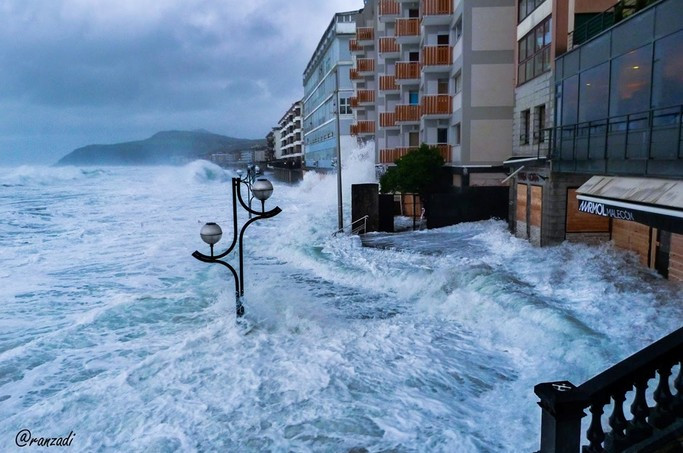Climate Change
Sustainable Living & City
Climate Adaptation & Resilience
Sea-level Rise & Erosion
Urban Planning
Coastal Living
Post-Doctoral Fellowships
Spain
2018.09.23
Are cities properly preparing for climate change?
Photo: Zarautz, Basque Country (Spain), February 2014. Photo by Asier Aranzadi

Adapting adaptation investment to climate-related risks
With this in mind, Olazabal set out to fill the gap and confront existing data on specific climate-related risks – a database developed by BC3 colleagues on climatic risks which covers 120 coastal cities –, and new data on adaptation investments in cities. « In a nutshell, the specific objectives of this project include the creation of a database to track urban climate change adaptation initiatives, the development of assessment methods for the effectiveness of those initiatives to reduce vulnerability or increase resilience to climate change and, finally, the validation of the relevance and usability of the outputs », she summarizes. « We will be asking questions such as: Have cities started planning? How? Are they already in the phase of implementing adaptation measures? Are they considering big, less likely disasters as well? We’ll also define indicators, metrics, to see if they are doing it right, according to the risks they are exposed to. ». The last step will be to do a big case study on a particular country, compare the policies in different cities and engage with policy makers and stakeholders. « We haven’t selected the country yet, but we’ll choose one that is critically exposed and that is relevant in terms of how they have developed plans so far », Olazabal specifies.
Adaptation to climate change, especially in densely populated areas, will be one of tomorrow’s most pressing challenges, even if the Paris Agreement’s 2°C objective can be attained. Dr. Olazabal’s research will innovatively address this challenge by setting out to understand how well current urban adaptation initiatives are designed, in relation to the specific risks each coastal city may be exposed to. Her cutting-edge approach will provide a timely and highly-needed global analysis on whether coastal cities are on the right track to be effective in reducing vulnerability to sea-level rise, and in building adaptive capacity. Her results will contribute to reducing coastal risks derived from climate change by helping policy makers to align adaptation strategies with expected impacts, therefore increasing policy efficacy.
Discover Marta's video:
Articles on Dr. Marta Olazabal's project

Marta
OLAZABAL
Institution
BC3 Basque Centre for Climate Change - Klima Aldaketa Ikergai
Country
Spain
Nationality
Spanish
Related articles
Sustainable Living & City
Climate Change
Climate Adaptation & Resilience
Urban Planning
Resilient Infrastructure & Safety
Environmental Justice
Post-Doctoral Fellowship
Australia
2023.06.20
Indicators for Climate Resilient City Planning
Expected start date:June-2023 Cities contribute enormously to global greenhouse emissions and are key drivers of climate change. By the same... Read more

Melanie
LOWE
Institut royal de technologie de Melbourne
Climate Change
Pollution
Aerosols & Particulate Matters
Public Health & Health Policy
Toxic Pollutants & Hazardous Substances
Post-Doctoral Fellowship
Greece
2023.06.01
Insight in Dust Fine-Mode to Mitigate Health Hazards in a Changing Climate
Expected start date:June-2023 In late-April/early-May 2022, a surge of remarkable dust storms ravaged Iraq, resulted- according to the World Health... Read more

Emmanouil
PROESTAKIS


